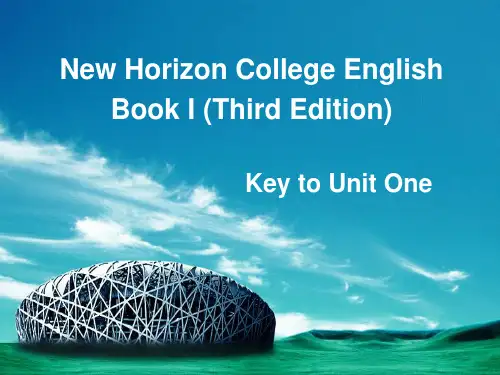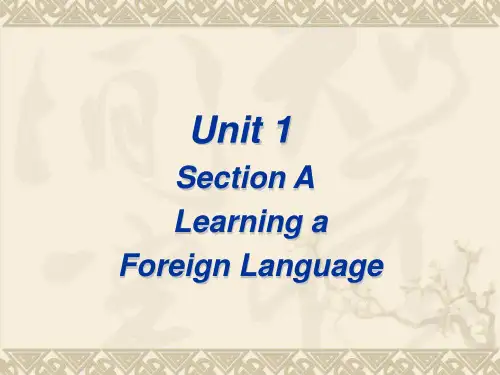新视野大学英语第二版第一册第一单元课件unit1
- 格式:ppt
- 大小:2.49 MB
- 文档页数:3
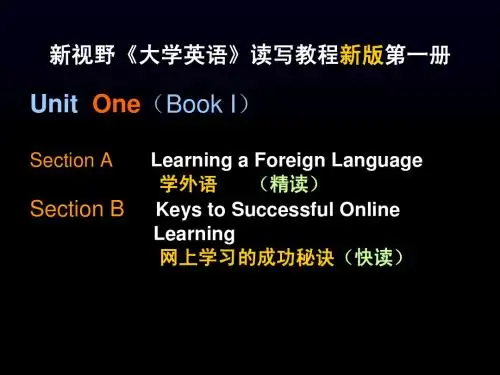
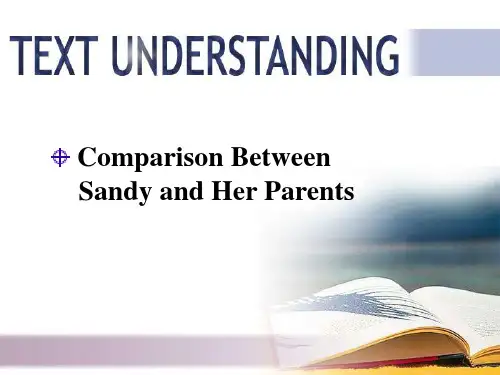


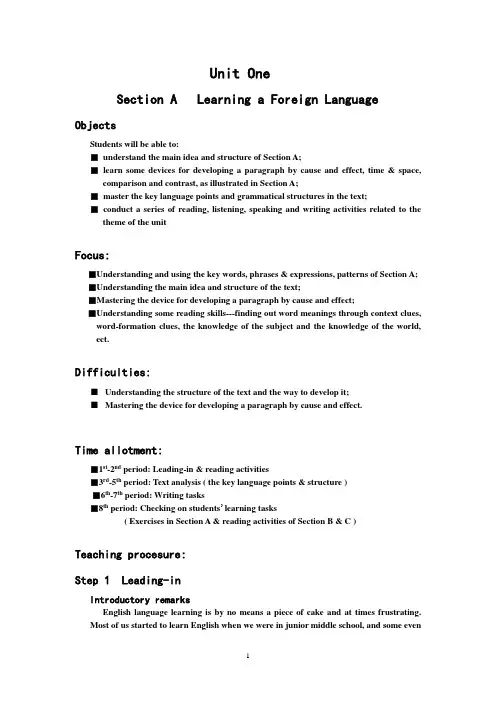
Unit OneSection A Learning a Foreign Language ObjectsStudents will be able to:■understand the main idea and structure of Section A;■learn some devices for developing a paragraph by cause and effect, time & space, comparison and contrast, as illustrated in Section A;■master the key language points and grammatical structures in the text;■conduct a series of reading, listening, speaking and writing activities related to the theme of the unitFocus:■Understanding and using the key words, phrases & expressions, patterns of Section A;■Understanding the main idea and structure of the text;■Mastering the device for developing a paragraph by cause and effect;■Understanding some reading skills---finding out word meanings through context clues, word-formation clues, the knowledge of the subject and the knowledge of the world, ect.Difficulties:■Understanding the structure of the text and the way to develop it;■Mastering the device for developing a paragraph by cause and effect.Time allotment:■1st-2nd period: Leading-in & reading activities■3rd-5th period: Text analysis ( the key language points & structure )■6th-7th period: Writing tasks■8th period: Checking on students’ learning tasks( Exercises in Section A & reading activities of Section B & C )Teaching procesure:Step 1 Leading-inIntroductory remarksEnglish language learning is by no means a piece of cake and at times frustrating.Most of us started to learn English when we were in junior middle school, and some evenearlier in elementary school. We enjoyed the successes and cried at our failures. On the one hand, we may enjoy learning it because it can bring us a lot of benefits. To begin with, it can teach us the value of practice. The more practice we do in listening, speaking, reading and writing, the more progress we make in English. Besides, it can give us insights into other cultures, keeping our mind open to new ways of thinking. And above all, it can help us communicate with many more people than before. On the other hand, we may fell frustrated sometimes because it may be too difficult to do well enough, or may puzzled that our English level stays at the same forever. Like most students of our age, we had to be faced with many problems in learning English, such as pronunciation, grammar rules, and cultural background. And the most frustrating one was how to memorize a large body of new words. As far as the college life is concerned now, however, our big trouble with English learning is that our class is very large and we have few chances to practice our spoken English in class. Now, I’d like to ask you some simple questions to get to know something about your English learning.Warming-up activityShort-answer-Questions1. When and where did you begin to learn English?Tips:—I began to learn English... years ago.—I have learned English for...—My experience with English began in... when...2.Do you enjoy learning English? Why?Tips:—No, I don’t enjoy it because it is useless/too difficult.—Yes, I enjoy it very much. It can help me➢find a good job after graduation.➢learn the cultures of other countries.➢make some foreign friends.➢learn the value of hard work.3. Do you have any trouble learning English? If any, what is it?— I always feel it difficult to...— It’s not easy for me to➢understand what others say.➢remember so many words.➢understand the grammar.➢read quickly.➢speak in public.➢4. What can you do online?Tips:----chatting online----meeting online---shopping online---searching for needed information---learning online ( learning English online)5. What are the advantages of learning English online?Tips:1. equal opportunity to do...2. any place, any time or pace3. cheaper and more convenient4. quicker and easier to get access tomuch information and to teachers5. student-centered6. no limit to the number of studentsStep 2 Reading activitiesIn the following text: Learning a Foreign Language, the author tells us his experience of learning English at different stages. He may share with us some experience of studying English. However, he did make great success in learning English by learning it online!●Reading for general ideaQuestions for thinking about1. What does the writer want to tell us?----His experience of learning English at different stages2. How does he make clear his story?---By cause and effect writing●Reading for some detailsQuestions for discussing1.What made the author’s English learning in junior middle school very successful?The kind and patient teacher and her positive method of praising all students often.2. How was the author’s experience with English learning in senior middle schooldifferent from his experience in junior middle school?In junior middle school, his English teacher was kind and patient. He liked to answer questions in class and he made much progress in English. But, in his senior middle school, his teache r punished those who gave wrong answers. He didn’t want to answer questions any more in class. As a result, he did not make much progress in English.3. In what way is the author’s experience with English in junior middle school similar tohis experience in college? In what way are they different from each other?In college and junior middle school, his English teachers were both patient and kind, but he didn’t have as many chances to answer questions in college as he did in junior middle school.4. Judging from the sixth paragraph, what is basic to online English learning?It requires much time, commitment and discipline to keep up with the flow of the course.5. What was the method the author used for online English learning?Hard work.6. Why didn’t t he author feel intimidated when he found some students could speakfaster than he could?He could take all the time he needed to consider his ideas and write a reply before posting it on the screen.7.Why wouldn’t the author trade his experience in learning a foreign language for anything else?Learning a foreign language taught him the value of hard work and gave him insights into another culture.8. According to the last paragraph, what interests the author most about English?He could communicate with many more people than before.Step 3 Detailed study of the text◆Language points:Words and phrases1. frustrate (L. 2) ( synonym: discourage, disappoint, upset, annoy )v. ①to cause sb. to feel angry or disappointed— Was there anything making you frustrated?—I was frustrated by…②to prevent someone’s plans, efforts from succeedingThe bad weather frustrated all our hopes of going out.2. to be well worth the effort(L. 3)Not everything in life is well worth our risk.3. positive (L. 6)adj.①effective; helpfulDon’t just watch give me some positive advice.②definite; allowing no room for doubtHe was expected to make a positive decision about whether these workers were to be fired.③sure; having no doubt about sth.She was positive that John would help her out of trouble.4. to be at the top of the class(L. 7)On the list of good policies in social contact, honesty should be at the top.5.to lose the desire/eagerness to say anything in English (L.14)As a result of her dishonesty, I lost my desire to form further friendship with her.6.to be far from perfect (L. 19) 远不尽人意Although our environment is still far from perfect, we haven’t lost the desire to change it for the better.7.to stay at the same level forever(L. 26)Sometimes our English learning seems to stay at the same level forever, but, in fact, this is not necessarily the case.8. intimidated (L.24)vt. Make one frightened by threatsThe thieves intimidated the general manager by saying that they world kill him.John intimidated his brother into telling their parents the truth.9.to get access to the necessary equipment(L. 30)Through online learning we get access to many new patterns of thinking.10.to keep up with the flow of the course(L. 33)To keep up with the flow of world trade, China decided to join WTO.11. commitment( L. 33)n. a promise to follow certain beliefs or certain course of actionsHe felt he didn’t have to make such a commitment to Mary.I don’t want to get married because I don’t want any commitments.12. to meet the minimum standards set by the course(L. 34)It also requires commitment and discipline to meet the minimum standards set by the university.13. to cry with frustration(L. 37) 因挫折而哭泣It often happens that while some jump with victory, others sigh with defeat.14. embarrass(L. 37)vt. Make one shy, ashamedIt embarrassed her that her husband was drunk at the dinner.This was an embarrassing situation for the gentleman for he couldn’t afford the dinner.15. to feel like giving up(L. 37)Unlike Zheng Pei-min, some officials only feel like enjoying pleasures as much as possible.16. to reap the benefits of hard work(L. 42) 尝到刻苦学习的甜头Online chatting made it possible for me to reap the benefits of English learning.17. not to trade/exchange/give sth for anything(L. 45) 拿什么都不换What impressed us most in that disaster was their readiness to give their lives for the public health.18. to teach me the value of hard work(L. 45)Much personal contact with him taught me the value of true friendship19. to give me insights into another culture(L. 46) 使我认识了另一种文化Good reading has given me insights into what good taste means.20. to keep my mind open to new ways of seeing things(L. 46) 使我从心里乐于接受新的看待事物的方式As long as we keep our minds open to anything helpful to social progress, our nation will be filled with hope21. to bridge the gap between different cultures(L. 52) 弥合不同文化之间的鸿沟The couple tried to bridge the gap between their emotions, but without any success.Patterns for using as models●Typical patterns for cause and effectBecause of this positive method, I eagerly answered all the questions I could, never worrying much about making mistakes. (L. 6)句型提炼Because of…, sb adv. does sth / is + adj. to do sth, never worrying /caring much about…由于……, 某人很……做某事,从不怎么担心….★Because of her strong desire for material wealth, she was eager to trade her power for★money, never worrying about any damage to larger interests.★Because of his undue interest in online surfing, he is likely to put all his mind on this business, never caring about his school work.●Typical patterns for comparison & contrast1) Now that I speak a foreign language, instead of staring into space when English is being spoken, I can participate and make friends. (L.50)句型提炼Now that sb. does / has done sth., instead of …, he / she can /should do sth. else.由于/既然某人做某事,而不再……, 他/她就能做另一事。


